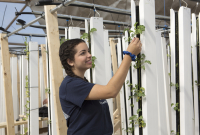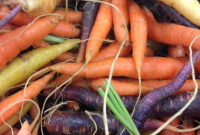Support strong Canadian climate journalism for 2025
Daily reports of struggles around the world got me thinking a lot about neighbours - both near and far - and the importance of sharing the abundance that many of us have.
We often forget about food banks or food centres when we’re not in the thick of the holiday spirit. It is very important to support these organizations year-round. There are many ways you can help. Cash, food donations and volunteering are all important pieces to assist the valuable places helping those in need.
Food banks are a relatively recent development in North America, having been around only since the late sixties. Unfortunately, they have become increasingly necessary. Food Banks Canada reported an increase in assistance of 27.8 per cent between 2008 and 2016. Almost 863,500 people used a food bank in Canada in the month of March, 2016.
Rachel Loopstra, a lecturer from Oxford University with a Ph.D. in nutrition, conducted a survey in Toronto and found that only one in five families suffering from food insecurity would turn to food banks, partially because of the stigma. Many of us are taught that asking for help suggests we are weak. But the opposite is true – no one is an island and it takes strength to realize when we need help and to ask for it.
There are many different models of food banks, but the standard in North America tends to provide warehouse-styled food distribution. This style is essentially a pick-up point for clients and doesn’t always provide for the needs of those using the food bank. These needs extend beyond just calories.
A law in France makes sure grocery stores don’t waste food
Thankfully there are many forward-thinking food centres such as The Stop in Toronto or the Parkdale Food Centre in Ottawa which aim for a more personal, involved and considerate approach with their clients. Being involved with those using the food banks, and with residents of the local area helps reduce the issues of shame and can improve an organization’s effectiveness. Would you want someone with no idea what your life is like making all the decisions about what you eat?

I think it’s common knowledge that the healthier and happier people are, the less disruptive and more productive we are. Our diet plays a huge roll in our mental and physical health. Some governments are trying to encourage healthier citizens by making sure they are better fed.
In France, legislation has been created to make sure food isn’t wasted by grocery stores – it goes to help those in need. In Brazil, neighbourhood gardens are encouraged, supported and provide large amounts of food in cities. Feeding populations with local food and increasing self-sufficiency has huge benefits.
Here in Canada, the University of Guelph has received more than $150 million dollars in private and government funds in the last year for agri-food studies. "It's not simply a matter of growing enough food,” said the university’s president, Franco Vaccarino. "We have to farm smarter." He said the funds will be used to address the challenges of food security, safety and sustainability.
By helping our friends and neighbours we are building stronger, healthier, happier communities of people who care about one another and will help us back if and when the time comes.






Comments